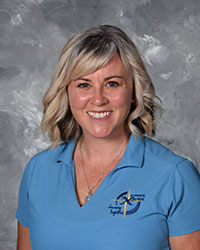“Andrea, two of my school board members want me to join the gossip group in our community on Facebook. They expect me to respond to every post that discusses the school. And the only real way I can join the group is with my personal profile. What should I do?”
I’ve received this email message more than once. Can you relate?
Let’s face it: EVERY community has gossip groups. They take the form of Facebook groups and Next Door discussions. And they’re full of people that love to talk about your school online.
The big question is, how do you control what’s going on inside of them? Especially when the discussion turns negative or misinformation starts to spread?
Easy answer: You can’t.
You can’t control what goes on in these groups. But you also can’t pretend that they don’t exist…
Today’s blog is packed with some practical advice regarding what you CAN do – from yours truly and several of your School PR colleagues.
 Looking for More Advice on Common School PR Topics? Subscribe to my podcast, “Mastering Social Media for Schools,” on your favorite podcast platform!
Looking for More Advice on Common School PR Topics? Subscribe to my podcast, “Mastering Social Media for Schools,” on your favorite podcast platform!
Be Aware – But Don’t Join
Identifying online community groups that like to talk about the school is important. It’s like being aware of where the quicksand is located on the trail that you’re hiking.
(Seriously, as a kid, I really thought quicksand was going to be a bigger issue!)
But just like quicksand, you should intentionally avoid being put in harm’s way. While it’s certainly tempting to join these groups so you know what’s going on, trust me when I say that it’s WAY too easy to get sucked in.
Because most of these groups are set up to not allow Facebook Pages to join them, your only option is to join as your personal profile. Before long, you’ll spend more time than necessary reading comments and jumping into discussions. Pretty soon, people will start to tag you anytime a school question or issue comes up. They will think that the Facebook group is their direct line to all things school-related.
In other words, you’ll always find yourself in reactive mode rather than proactive mode.
Is that really something you want to have to manage, on top of every other responsibility? My gut reaction is NO – you don’t have time and you certainly don’t get paid enough!!
Build Relationships with Advocates
Instead of joining the group(s) yourself, find a few trusted people you know that are in the group(s) who can let you know if there is a hot topic related to your school. Remember, they’re there to be your eyes and ears – not your voice! They should simply relay information back to you as the communications pro to address in your own way, as needed.
 Why? Well, many parent-run pages will eventually self-correct. As Kristen Sutek, the Community Relations Manager for Pine Lake Prep in North Carolina says, “A reasonable parent will show up to shut the circus down, but it might not happen quickly enough.”
Why? Well, many parent-run pages will eventually self-correct. As Kristen Sutek, the Community Relations Manager for Pine Lake Prep in North Carolina says, “A reasonable parent will show up to shut the circus down, but it might not happen quickly enough.”
That’s where your listeners can also become your advocates – if they are comfortable! These helpful, positive parents or community members will look for opportunities to steer people in the right direction.
An easy way to help these advocates is by giving them a simple script to use in their comments, such as:
“I think the best place to find that information would be the school website: ____”
or
“This sounds like something the school would talk to you about directly. Have you tried reaching out? Here’s the phone number: ____”
These gentle redirects may shut down discussions before they spiral out of control. Remember, you’re not asking that person to defend every decision the school makes, or to be able to fully explain the school’s position, but rather to be a voice of reason!
Move Discussions Offline
Perhaps there are a few persistent voices of dissent, negativity, or misinformation in your community group. It could make sense to start some offline conversations.
 Todd Porter, Director of Communications for Jackson Local School District in Ohio, shared the following:
Todd Porter, Director of Communications for Jackson Local School District in Ohio, shared the following:
“We actually invited the moderator of the group in for a 45-minute discussion with the superintendent and other members of the admin team during the summer. This makes them feel like they are getting a look behind the curtain. More importantly, they feel as though they are part of the team and therefore part of the solution and helping us mitigate rumors and bad information.”
A quick phone call could also do the trick, especially if the person is known to your school, such as a parent.
Correct Misinformation Through Your Own Channels
If some rumblings just won’t go away, it could be worth addressing the gossip head-on through mass communications. I recommend direct communication with families, whenever possible.
For example, let’s say community groups are sharing incorrect information about your school’s COVID safety plan. And despite your advocate’s efforts to point them in the right direction, questions and confusion are still circulating.
In this situation, you could send out a direct communication to all families that clearly states the school’s health safety plans and policies.
 You could also choose to correct misinformation on the school’s official social media page(s). Cala Smoldt, Communications Coordinator for Sherrard CUSD 200 in Illinois shared this advice:
You could also choose to correct misinformation on the school’s official social media page(s). Cala Smoldt, Communications Coordinator for Sherrard CUSD 200 in Illinois shared this advice:
“Know what’s happening in those groups (but don’t obsess). If there are big ongoing conversations or misconceptions – it’s an opportunity to put out information from the school with the correct info, in a subtle way.
For instance, if we see something going around, we will address it in our “tiger talks” (where the superintendent talks somewhat candidly about what’s going on across the district, need to know info, etc). It’s embedded in the info, but it isn’t the main focus.”
 Another idea is to create a “Positive Parent” group. Jackie Brauser is the Director of Admissions and Development for St. Francis Xavier School in Ohio. She advises:
Another idea is to create a “Positive Parent” group. Jackie Brauser is the Director of Admissions and Development for St. Francis Xavier School in Ohio. She advises:
“We use our Positive Parent group to try to corral a conversation if it gets out-of-line on our school’s community (unofficial) page. We are a private school, but this group created last year is a Godsend. If they can’t handle it, they report it to me (I usually already know about it, but I am silent) to take the next steps.”
I hope this blog empowers you to draw a hard line regarding your presence (or the pressure to have a presence) in community gossip groups. If you have an experience to share, don’t hesitate to find me on Twitter!


